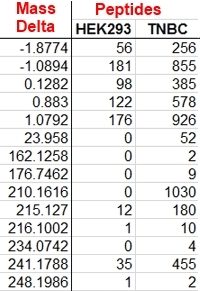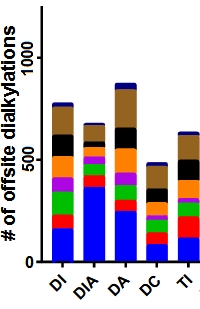|
To view this email as a web page, click here. |
 |
|
Welcome
We are posing the Dark Matter Challenge to identify some of the common, yet still unidentified
mass differences in peptide search results.
Click here to enter or read more below.
This month's highlighted publication explains the problematic side effects arising from reduction and alkylation of proteins.
If you have a recent publication that you would like us to consider for an upcoming Newsletter, please
send us a PDF or a URL.
Mascot tip of the month concerns anti-virus software.
Please have a read and feel free to contact us if you have any comments or questions. |
|
|
|
 |
 |
 |
|
The Dark Matter Challenge - Enter to win
'Mass tolerant' or 'open' searches report some very abundant mass differences that do not correspond to modifications in Unimod and so go undetected in conventional searches. This is both intriguing and unsatisfactory. Are they real or artefacts? If real, how can they have been overlooked for so long?
To try to solve this conundrum, we have selected twenty of these mass deltas and are challenging you to identify one or more. For each delta, we will award a prize of $100US to the person who first submits a credible assignment. Credible means
- A possible chemical formula or reaction pathway, not just an elemental composition
- Chemistry must be consistent with the sample preparation and analysis as described in the associated paper
- Exotic elements or unnatural isotopes cannot be introduced without some reasonable explanation
- Mass accuracy appears to be excellent, so the assignment needs to be within 0.005 Da of the experimental delta
Go Here to Enter, read about the details, and submit your assignments.
|
 |
 |
 |
 |
|
Featured publication using Mascot
Here we highlight a recent interesting and important publication that employs Mascot for protein identification, quantitation, or characterization. If you would like one of your papers highlighted here please send us a PDF or a URL.
|
|
|
Systematic Evaluation of Protein Reduction and Alkylation Reveals Massive Unspecific Side Effects by Iodine-containing Reagents
Torsten Mueller and Dominic Winter
Molecular & Cellular Proteomics, 16 (2017) 1173-1187
Despite the near-ubiquitous nature of reduction and alkylation in proteomics workflows, there has not been a systematic examination of how it impacts the proteins identified. In this paper the authors evaluated the reduction and alkylation of proteins using three reducing agents (DTT, TCEP, and BME) in combination with four alkylation agents (IAA, IAC, AA, and CAA). They tested these conditions using strong anion exchange fractionated in-solution digests and in-gel digested fractions of samples enriched for cytosolic proteins of HeLa cells.
Among the evaluated alkylation reagents, IAA and IAC resulted in the lowest efficiencies of peptide identification across all conditions. This indicates that the iodine-containing reagents lead to the highest numbers of non-specifically modified peptides.
Using dimethyl labeling, mass tolerant searches, and synthetic peptide experiments, they identified alkylation of methionine residues by iodine-containing alkylation reagents as one of the major factors for the differences. There were differences of more than 9-fold in the numbers of identified methionine-containing peptide spectral matches for in-gel digested samples between iodine- and non-iodine-containing alkylation reagents.
|
 |
 |
 |
 |
|
Mascot tip of the month
Most people use some sort of anti-virus (AV) package to protect against malicious software, especially on Microsoft Windows. Occasionally, this can interfere with the correct operation of Mascot.
The most frequent issues are associated with real-time file scanning. If the AV locks a result file or a cache file while it is being written, this can cause a timeout or an error. Even if there is no error, copying or processing of large files, such as Fasta databases, can be made slower. False positives, where a Mascot executable is mistakenly deleted or quarantined, are much rarer, but not unknown.
It is important to recognise that a dedicated Mascot Server is much less at risk than a PC used for browsing the web or downloading email attachments. Some files are downloaded by Mascot, but these are text files from known, reliable sources. Yes, in theory someone could substitute a malicious executable for a Fasta or XML file on the NCBI or EBI or Matrix Science web sites, but this can only cause a problem in the unlikely event that someone then tries to execute it.
So, while liability concerns make us hesitate to say it is perfectly safe to exclude the Mascot directory from AV scanning, it is something you might seriously consider. Even if your Mascot Server is Linux, and somewhat less liable to infection, AV can cause problems on the client side. More than one customer has reported mysterious problems with reports failing to load which turned out to be over-active AV 'protecting' the web browser. Sophos, which once detected its own updater as malware, is a name that comes up more often than others. |
 |
 |
 |
 |
|
About Matrix Science
Matrix Science is a provider of bioinformatics tools to proteomics researchers and scientists, enabling the rapid, confident identification and quantitation of proteins. Mascot software products fully support data from mass spectrometry instruments made by Agilent, Bruker, Sciex, Shimadzu, Thermo Scientific, and Waters.
Please contact us or one of our marketing partners for more information on how you can power your proteomics with Mascot.
|
 |
 |
|
|